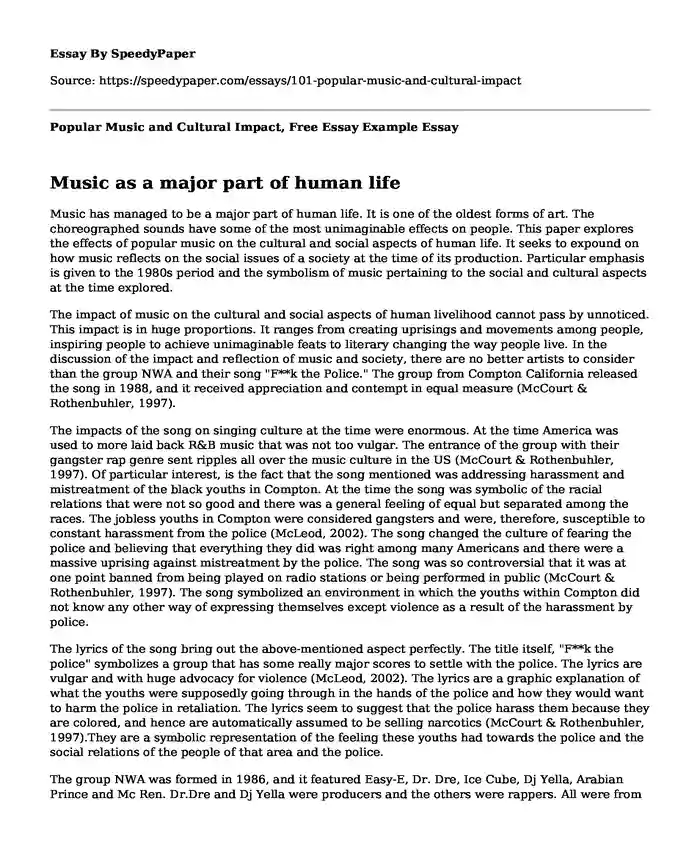Music as a major part of human life
Music has managed to be a major part of human life. It is one of the oldest forms of art. The choreographed sounds have some of the most unimaginable effects on people. This paper explores the effects of popular music on the cultural and social aspects of human life. It seeks to expound on how music reflects on the social issues of a society at the time of its production. Particular emphasis is given to the 1980s period and the symbolism of music pertaining to the social and cultural aspects at the time explored.
The impact of music on the cultural and social aspects of human livelihood cannot pass by unnoticed. This impact is in huge proportions. It ranges from creating uprisings and movements among people, inspiring people to achieve unimaginable feats to literary changing the way people live. In the discussion of the impact and reflection of music and society, there are no better artists to consider than the group NWA and their song "F**k the Police." The group from Compton California released the song in 1988, and it received appreciation and contempt in equal measure (McCourt & Rothenbuhler, 1997).
The impacts of the song on singing culture at the time were enormous. At the time America was used to more laid back R&B music that was not too vulgar. The entrance of the group with their gangster rap genre sent ripples all over the music culture in the US (McCourt & Rothenbuhler, 1997). Of particular interest, is the fact that the song mentioned was addressing harassment and mistreatment of the black youths in Compton. At the time the song was symbolic of the racial relations that were not so good and there was a general feeling of equal but separated among the races. The jobless youths in Compton were considered gangsters and were, therefore, susceptible to constant harassment from the police (McLeod, 2002). The song changed the culture of fearing the police and believing that everything they did was right among many Americans and there were a massive uprising against mistreatment by the police. The song was so controversial that it was at one point banned from being played on radio stations or being performed in public (McCourt & Rothenbuhler, 1997). The song symbolized an environment in which the youths within Compton did not know any other way of expressing themselves except violence as a result of the harassment by police.
The lyrics of the song bring out the above-mentioned aspect perfectly. The title itself, "F**k the police" symbolizes a group that has some really major scores to settle with the police. The lyrics are vulgar and with huge advocacy for violence (McLeod, 2002). The lyrics are a graphic explanation of what the youths were supposedly going through in the hands of the police and how they would want to harm the police in retaliation. The lyrics seem to suggest that the police harass them because they are colored, and hence are automatically assumed to be selling narcotics (McCourt & Rothenbuhler, 1997).They are a symbolic representation of the feeling these youths had towards the police and the social relations of the people of that area and the police.
The group NWA was formed in 1986, and it featured Easy-E, Dr. Dre, Ice Cube, Dj Yella, Arabian Prince and Mc Ren. Dr.Dre and Dj Yella were producers and the others were rappers. All were from Compton and were brought together by the need to make something out of their lives. They wanted to find a unique way to express themselves and reach out to the masses (McLeod, 2002).
At the time of the song's release, there were social challenges pertaining to race in America and across the world (McLeod, 2002). The racial disintegration of people was rampant across the world and hence relationships between races were strained. In particular, a jobless black youth in America would be almost automatically assumed to be dealing in peddling narcotics on the streets (McLeod, 2002). In as much as a good number were doing so not all of them were and putting them all in one basket was unfair. The political structure was also seen as backing the police in harassing these youths and therefore a platform of massive controversy (McLeod, 2002). The group's songs spread over the world and had huge effects on how youths responded when they felt offended or oppressed by a regime.
References
McCourt, T., & Rothenbuhler, E. (1997). SoundScan and the consolidation of control in the popular music industry. Media, Culture & Society, 19(2), 201-218.
McLeod, K. (2002). The Politics and History of Hip-Hop Journalism. Pop Music and the Press, 12, 156.
Cite this page
Popular Music and Cultural Impact, Free Essay Example. (2019, Apr 08). Retrieved from https://speedypaper.com/essays/101-popular-music-and-cultural-impact
Request Removal
If you are the original author of this essay and no longer wish to have it published on the SpeedyPaper website, please click below to request its removal:
- Free Essay Sample on Historical Foundation of Aesthetics
- Historical Essay Sample: Abraham Lincoln's Plans for Reconstruction of United States
- Free Essay Sample: Gender Inequality in Jane Eyre
- Compare and Contrast Essay Sample: The Renaissance and Contemporary Society
- A Literary Essay Sample on the Of Love and Other Demons Novel
- The Shattering of the Union - Book Review Essay Sample
- Essay Example on Tesco Plc: Impact of Legislative and Regulatory Requirements
Popular categories





